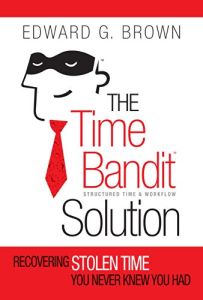Join getAbstract to access the summary!

Join getAbstract to access the summary!
Edward G. Brown
The Time Bandit Solution
Recovering Stolen Time You Never Knew You Had
Greenleaf Book Group, 2015
What's inside?
Your employees lose 40% to 60% of their time to interruptions. The worst interrupters are your employees themselves.
Recommendation
Although author Edward G. Brown grew up in humble circumstances in the East Bronx, he developed a successful career managing Hollywood celebrities – including Hawaiian singer Don Ho – owning restaurants and nightclubs, producing chart-breaking music, and partnering with Roy Rogers, the “King of the Cowboys.” Brown, co-founder of the Cohen Brown Management Group, taught himself how to manage his diverse, often stressful professional activities. He bases his time-management program on his business and life experiences and on the academic fields of management theory, psychology and sociology. While he sometimes bogs down in time-consuming detail, getAbstract recommends Brown’s effective time-management program, and his sensible ideas about avoiding interruptions and managing your work schedule. His top-quality presentation makes this vividly illustrated (even glitzy) book an ideal choice for anyone who wants to work more efficiently.
Summary
About the Author
Edward G. Brown is co-founder of Cohen Brown Management Group, whose clients include Wells Fargo, Bank of America, Citibank, Prudential Life and Merrill Lynch.
















Comment on this summary
I fee that the tricky part in this approach again is the 'Who'.